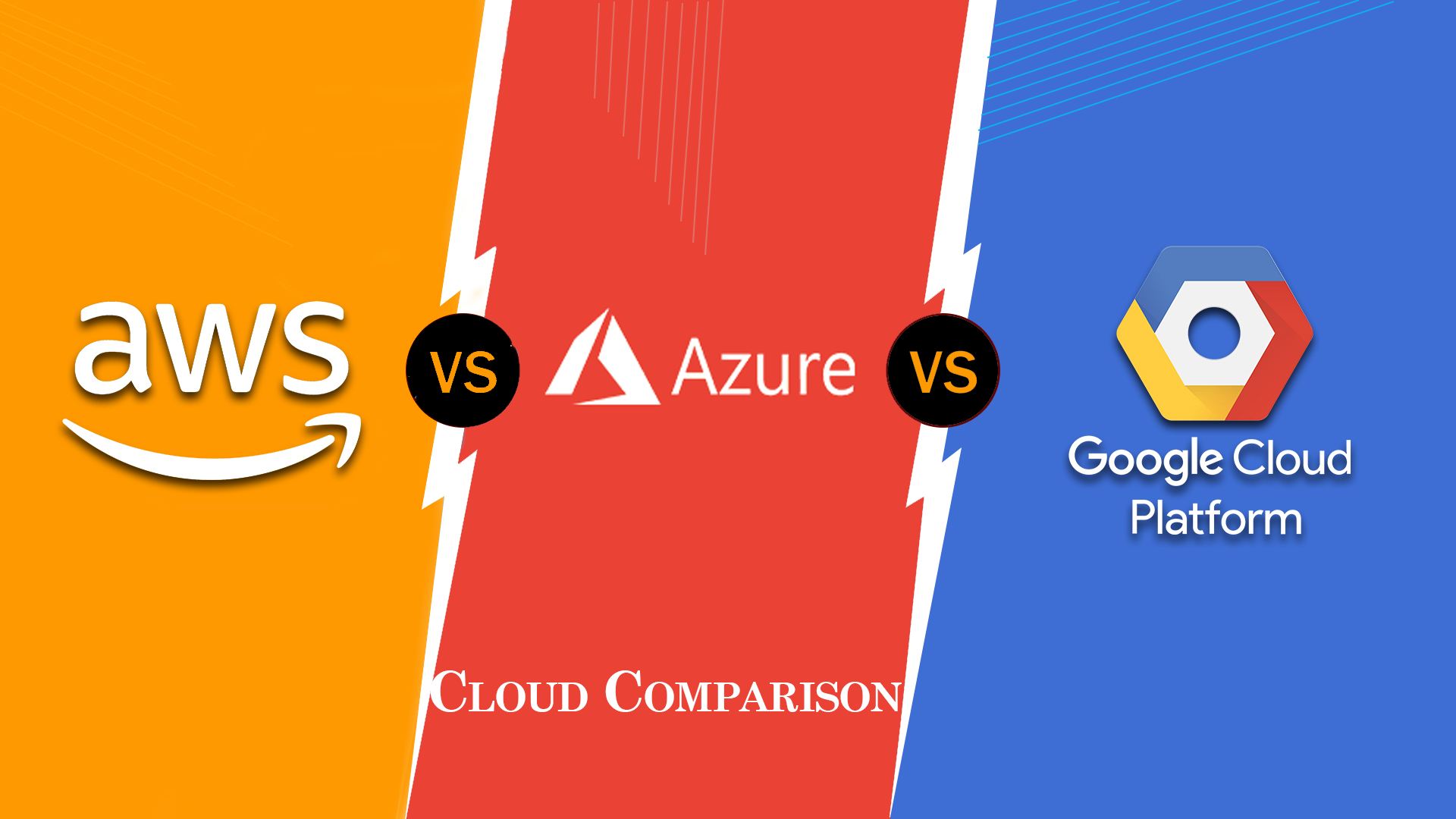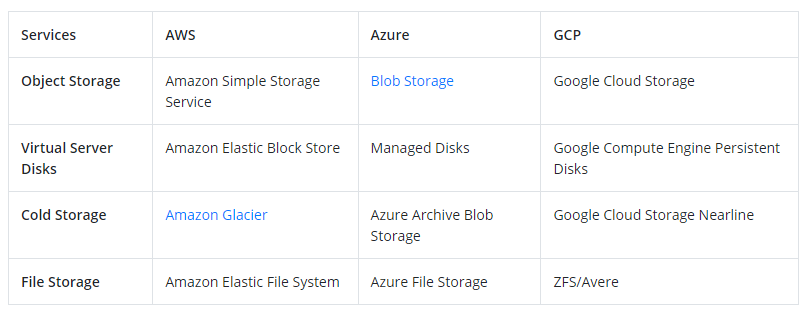You’re probably already aware of the advantages of cloud computing. Now it’s time to take the next step and find a great cloud provider that can make a significant difference for your company.
There are certain heavyweights in the cloud computing sector. Companies like Netflix, Goldman Sachs, and Boeing use Amazon AWS, Google Cloud Platform (GCP), and Microsoft Azure to dominate the industry. Each of these companies has established a reputation as a go-to infrastructure supplier with a variety of cloud computing services.
So, how do you sift through the cloud computing trends and choose the best cloud computing platforms for your needs?
In our AWS vs. Azure vs. Google Cloud Platform Comparison, we’ve broken down the top three cloud vendors in hopes of making your move to cloud computing as smooth as possible.
However according to a Synergy Research Group from 2020 report “Amazon growth continued to closely match overall market growth, thus it retained its 33 percent share of the worldwide [cloud] market,” . Second-placed Microsoft gained at a higher rate than the market, increasing its market share by over three percentage points in the last four quarters to 18 percent.”
This article covers storage and compute pricing across AWS, Azure, and Google Cloud to show you the nuanced differences between these providers.
Here’s the summary cloud comparison between AWS vs. Azure vs. Google:
AWS Vs. Azure Vs. Google: About
-
Amazon Web Services
Amazon Web Services is a subsidiary of Amazon.com that offers a subscription-based on-demand Cloud Computing platform to people, businesses, and governments. Businesses select AWS to construct their mobile apps, for its range and depth of services . AWS is the appropriate choice for many teams because of its extensive toolkit, which includes databases, analytics, administration, IoT, security, and corporate apps. It’s no surprise that AWS has the largest share of the cloud market.
-
Microsoft Azure
Like AWS, Azure is an integrated platform that offers computing, storage, development, and database opportunities as SaaS, IaaS, PaaS. Azure also has a number of enterprise services, and Microsoft’s extensive history with this market makes it a natural choice for some customers. Organizations can use Azure, Office 365, and Microsoft Teams to give corporate software to employees while also accessing cloud computing resources.
-
Google Cloud Platform
Google Cloud Platform (GCP) is a set of Cloud Computing services supplied by Google that run on the same infrastructure that Google uses internally for its end-user products such as Google Search, YouTube, and others.
Google Cloud Platform began its journey in 2011, and in less than a decade it has managed to create a good presence in the cloud industry. Google, a well-funded underdog in the fight, entered the cloud industry later and lacks the enterprise focus that attracts corporate clients. However, it has extensive technical knowledge and industry-leading tools in deep learning and artificial intelligence, machine learning, and data analytics.
AWS Vs. Azure Vs. Google: Compute
-
AWS Compute
The Amazon Elastic Compute Cloud, or E2C, is Amazon’s primary computing service. Because of its compatibility with the vast majority of other Amazon Web Services, it is highly flexible and perhaps less expensive than other services. E2C can monitor your cloud apps and scale your consumption to your current demands with the auto scaling monitor, ensuring that you don’t overpay for your computing needs.
Amazon Elastic Container Service, or ECS, is the company’s own container service. To control IP address blocking and access a variety of logs, templates, IAM roles, and security groups, you can configure these docker containers as needed or use preloaded configurations. It also provides Lightsail, a virtual private cloud, Batch for batch computing operations, Elastic Beanstalk for operating and scaling web applications, and a few other services.
-
Microsoft Compute
Virtual Machines are Microsoft Azure’s principal cloud-based computation service. It features better security, hybrid cloud capabilities, and integrated support for Microsoft software, as well as support for Linux, Windows Server, SQL Server, Oracle, IBM, and SAP. It, like AWS, provides a massive library of available instances, including GPU and high-performance computing possibilities, as well as instances specialized for AI and machine learning.
It enables enterprises that traditionally require several teams to collaborate online in a single location. The following are some other Azure computing features such as Azure Platform as a Service (PaaS), Fabric for Azure Batch Service, Functions in Azure, Azure Spring Cloud – which includes Java Spring Cloud support.
-
Google Compute
Compute Engine is the company’s main service, and it offers bespoke and pre-defined machine kinds, per-second charging, Linux and Windows compatibility, automated discounts, and more. It also boasts a carbon-neutral architecture that utilizes nearly half as much energy as conventional data centers. It also offers a free f1-micro instance per month for a year. Google iWeakness is a Kubernetes pioneer and provides a Kubernetes engine for enterprises interested in container deployment.
AWS Vs. Azure Vs. Google: Storage
-
AWS Storage
Simple Storage Service (S3) for object storage, EBS or Elastic Block Storage (EBS) for persistent block storage for use with EC2, and EFS or Elastic File System for file storage are all available through AWS. Storage gateway is a hybrid storage environment, and Snowball is a physical hardware device that can transmit petabytes of data without the use of the internet.
AWS’ database offerings include Aurora, an AQL-compatible database, Relational Database Service (RDS), DynamoDB NoSQL database, Elasticache in-memory data store, RedShift data warehouse, Neptune graph database, and Database migration service. Amazon’s Glacier provides long-term archive storage at very affordable prices. This storage gateway is simple to set up for backups.
-
Azure Storage
Azure, like AWS, offers a variety of storage cloud options to suit a variety of business needs. Larger enterprises with high data storage demands might choose Azure Data Lake Storage and Queue Storage. Blob storage, on the other hand, is suitable for businesses that need to store massive amounts of unstructured data. Meanwhile, File Storage is dependable and well-suited to the majority of business requirements.
The database choices in Azure are especially wide. SQL Database, MySQL Database, and PostgreSQL Database are the three SQL-based choices. It also includes a Data Warehouse, Cosmos DB, and Table Storage for NoSQL. The Server Stretch Database is its hybrid storage service, created exclusively for enterprises that use Microsoft SQL Server in their own data centers. Redis Cache is its in-memory service. In contrast to AWS, Microsoft provides a backup service, as well as Site Recovery and Archive Storage.
-
Google Storage
GCP offers an increasing number of storage options. Its unified object storage service, Cloud Storage, also has a Persistent Disk option. It provides an AWS Snowball-like Transfer Appliance as well as online transfer services. However, what is available is reliable and wide-ranging in support, as GCP features both SQL and no-SQL databases. Currently, options includes are Cloud SQL, Cloud Datastore, Cloud Bigtable, Cloud Spanner. It does not have backup and archive services.
AWS Vs. Azure Vs. Google: Pricing
When it comes to price, these well-known systems all have two things in common: a free tier with severely limited possibilities and a per-[hour or minute]on-demand pricing structure for all resources. Unfortunately, pricing varies widely depending on resource use, service selection, and other factors, making comparison impossible.
However, we’ve outlined the features available in the free tier, as well as a quick comparison of each service’s price structure.
-
AWS Pricing
Things aren’t made any easier by Microsoft Azure. Microsoft’s pricing structure can be difficult to understand without outside support and/or extensive knowledge due to its numerous software licence options and usage of situation-based discounts.
-
Azure Pricing
Azure users frequently utilize a third-party software to control costs, similar to how AWS users do. Azure, like AWS, offers a free tier with 12 months of 750hr/month Virtual Machines and a substantial discount for a 1-3 year commitment.
-
Google Pricing
Google has attempted to learn from its competitors’ failures by using a simple fee per second model. Additionally, GCP’s free tier gives one free micro-instance per month for the first year, a $300 credit for a year of service, and a 30% discount for long-term use.
AWS Vs. Azure Vs. Google: What’s Best For You?
As stated at the outset of this post, the ideal public cloud vendor for you will be determined by your requirements and workloads. Actually, the best vendor for some of your projects may not be the greatest vendor for others. AWS might be a good option if you need a lot of reach and a lot of features. GCP may be a better option for enterprises looking for a lower pricing point and maximum innovation. Alternatively, if you predominantly use Microsoft goods, Azure may be the obvious alternative.
Furthermore, Azure’s deep focus on the hybrid cloud will help you bridge the legacy data center environment with the rapidly scalable (and feature-rich) Microsoft cloud. Google is rapidly expanding, yet it is still a work in progress. Naturally, the search giant has little prior experience interacting with businesses. However, it is totally dedicated to cloud computing and has invested billions. It’s also partnering with Cisco, which is well-versed in the industry.
We specialize in custom cloud solution implementation. You can contact us to learn more about how we can help you with your project.




